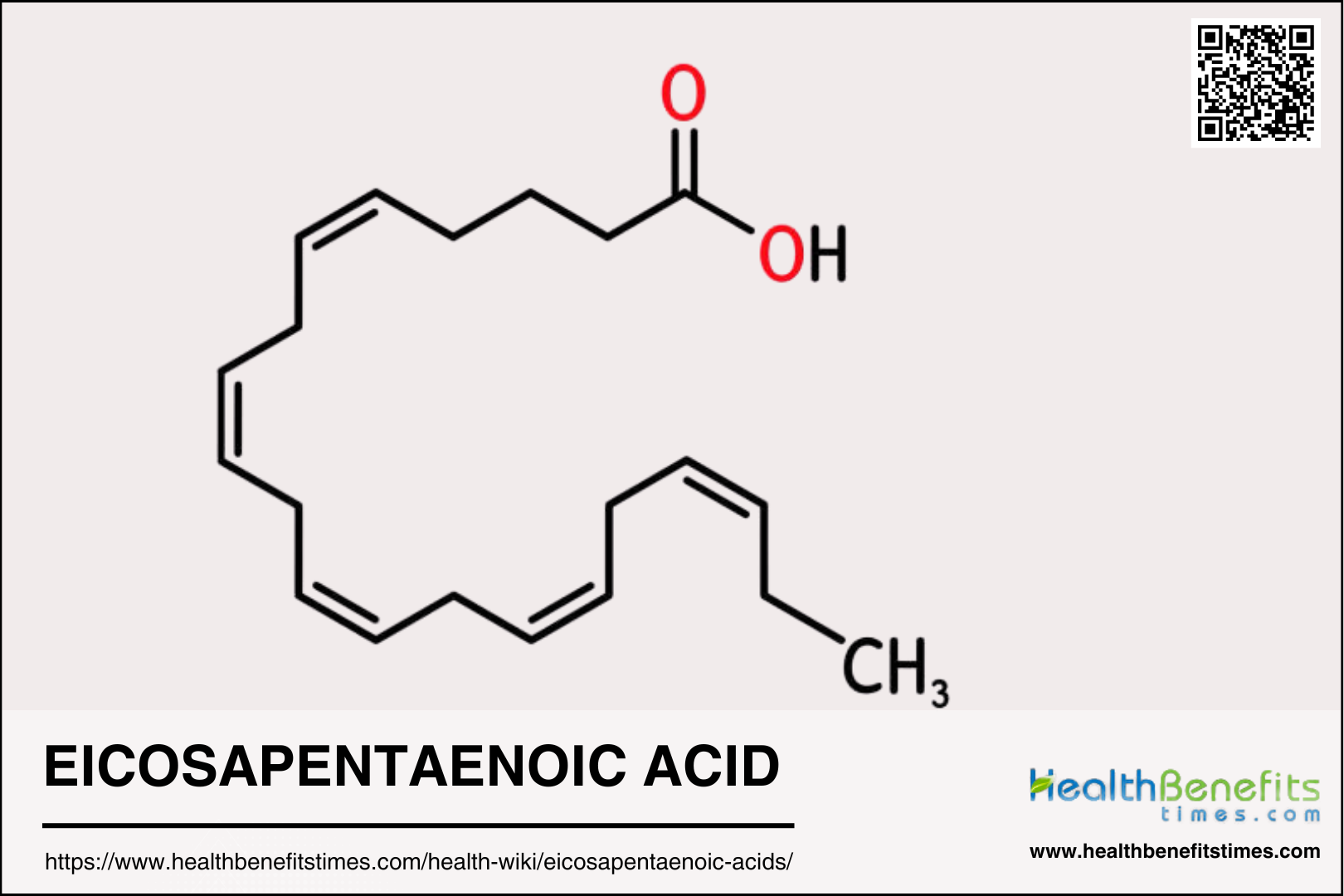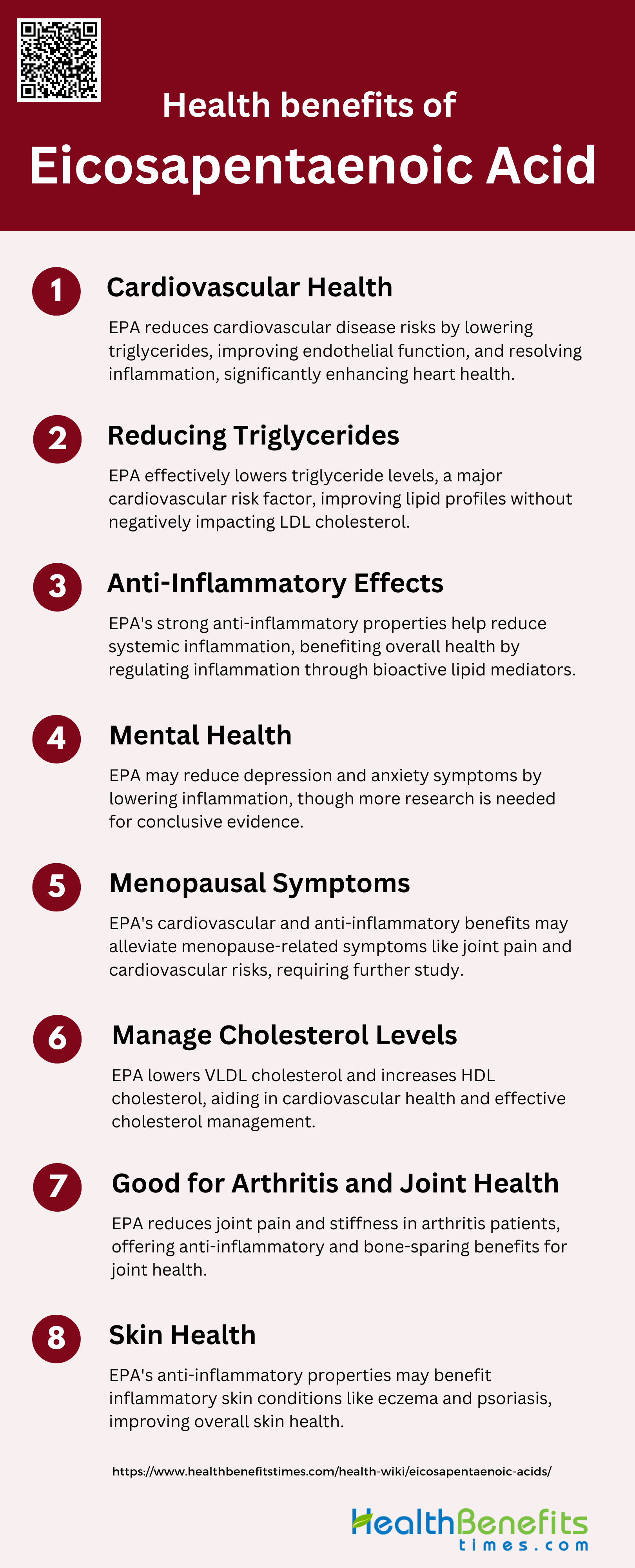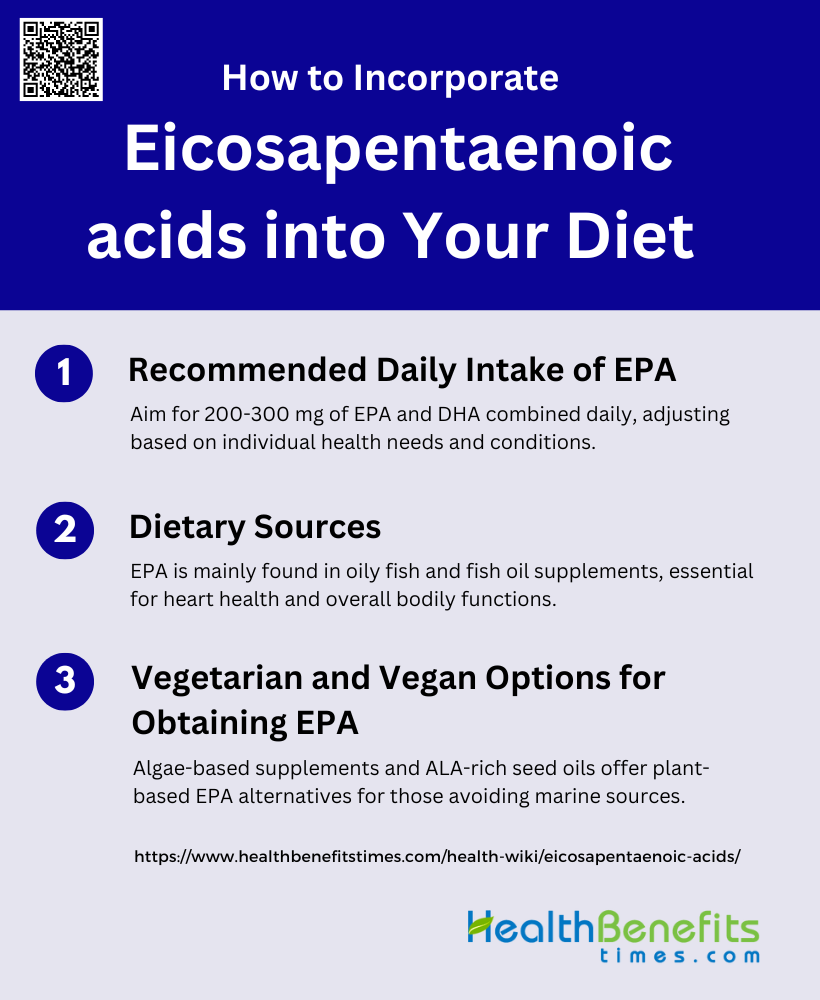Eicosapentaenoic acid (EPA) is a long-chain omega-3 polyunsaturated fatty acid predominantly found in fish oils. It has been extensively studied for its potential health benefits, particularly in the context of cardiovascular health, cancer cachexia, and metabolic disorders. EPA has been shown to reduce triglyceride levels significantly without increasing low-density lipoprotein (LDL) cholesterol levels, making it a valuable therapeutic agent for patients with very high triglyceride levels. Additionally, EPA has demonstrated efficacy in reducing blood pressure in individuals with mild essential hypertension. In cancer cachexia, EPA has been used to decrease weight loss and improve quality of life, although the optimal dose remains undetermined. Furthermore, EPA has been found to ameliorate steatohepatitis and inhibit the development of hepatocellular carcinoma in experimental models. These diverse effects highlight the potential of EPA as a multifaceted therapeutic agent in various clinical settings.
Chemical structure of Eicosapentaenoic acids
Eicosapentaenoic acid (EPA) is a polyunsaturated fatty acid characterized by a 20-carbon chain and five cis double bonds located at the 5, 8, 11, 14, and 17 positions (20:5ω-3). The chemical structure of EPA can be altered through various processes, such as microbial synthesis and chemical synthesis, to produce different isomers. For instance, the mono trans geometrical isomer of EPA, 5c,8c,11c,14c,17t-eicosapentaenoic acid, can be synthesized through fatty acid microbial conversion using a Δ12-desaturase defective mutant of Mortierella alpina. Additionally, the natural cis double bond geometry of EPA can be transformed to the trans configuration during the deodorization process in the food industry, leading to the formation of monotrans EPA isomers. These structural variations of EPA are significant as they influence its biological activity and potential health effects, such as its role in anti-inflammatory pathways and its incorporation into liver mitochondrial membranes.
Sources of Eicosapentaenoic acids
It is a vital omega-3 fatty acid known for its numerous health benefits, including reducing inflammation and supporting heart health. There are various sources of EPA, which can be broadly categorized into natural sources and supplements. Below are the primary sources of EPA:
1. Natural Sources
Eicosapentaenoic acid (EPA) is primarily obtained from natural sources such as
- Fatty Fish: Fatty fish such as salmon, mackerel, and sardines are rich in eicosapentaenoic acid (EPA), a type of omega-3 fatty acid. These fish accumulate EPA through their diet, primarily by consuming algae and smaller fish. The consumption of fatty fish has been linked to numerous health benefits, including improved cardiovascular health and reduced inflammation. Regular intake of these fish can significantly increase EPA levels in the body, contributing to overall well-being.
- Algae: Algae are a primary source of EPA in the marine food chain. They are particularly important for vegetarians and vegans who seek to increase their omega-3 intake without consuming fish. Algal oil supplements have been shown to effectively raise blood levels of EPA and DHA, similar to fish oil supplements. This makes algae a sustainable and plant-based alternative for obtaining these essential fatty acids.
- Breast Milk: Breast milk naturally contains EPA, which is crucial for the development of infants. The fatty acid profile of breast milk can be influenced by the mother’s diet, particularly her intake of omega-3-rich foods like fish or supplements. Ensuring adequate EPA levels in breast milk is important for the neurological and visual development of the infant, highlighting the importance of maternal nutrition during lactation.
- Flaxseeds and Walnuts: Flaxseeds and walnuts are rich in alpha-linolenic acid (ALA), a precursor to EPA. However, the conversion rate of ALA to EPA in the human body is relatively low. Despite this, regular consumption of these seeds and nuts can still contribute to overall omega-3 intake and offer various health benefits, including improved heart health and anti-inflammatory effects. They are particularly valuable for those following a vegetarian or vegan diet.
2. Supplements
For those who may not consume enough EPA through diet alone, supplements offer an alternative, including:
- Fish Oil: Fish oil supplements are a popular and effective way to increase EPA intake. These supplements are derived from the tissues of oily fish and are rich in both EPA and DHA. Numerous studies have shown that fish oil supplementation can reduce the risk of cardiovascular diseases, improve mental health, and decrease inflammation. They are widely recommended for individuals who do not consume enough fatty fish in their diet.
- Cod Liver Oil: Cod liver oil is another supplement rich in EPA and DHA, along with vitamins A and D. It has been traditionally used to support bone health, immune function, and cardiovascular health. The high levels of EPA in cod liver oil make it an effective supplement for reducing inflammation and supporting overall health. However, due to its high vitamin A content, it should be consumed in moderation to avoid toxicity.
- Krill Oil: Krill oil is derived from tiny crustaceans and is a potent source of EPA and DHA. It is known for its high bioavailability, meaning the body can absorb and utilize the omega-3s more efficiently compared to other sources. Krill oil also contains antioxidants like astaxanthin, which provide additional health benefits. Studies suggest that krill oil can effectively reduce inflammation and improve lipid profiles, making it a valuable supplement for heart health.
- Algae Oil: Algae oil is a plant-based supplement that provides a sustainable and vegan-friendly source of EPA and DHA. It is particularly beneficial for individuals who do not consume fish or fish oil. Research indicates that algae oil can significantly increase blood levels of EPA and DHA, similar to fish oil, making it an excellent alternative for maintaining optimal omega-3 levels. Its production is also environmentally friendly, contributing to its growing popularity.
Health benefits of Eicosapentaenoic Acid
Its anti-inflammatory properties help reduce the risk of chronic diseases, while its role in heart health is well-documented. Below are some of the key health benefits of EPA:
1. Cardiovascular Health
Eicosapentaenoic acid (EPA) has been shown to significantly reduce cardiovascular disease (CVD) risk factors. Studies indicate that EPA can lower triglyceride levels and improve endothelial function, which are critical for cardiovascular health. Additionally, EPA has been found to modulate T-cell differentiation and promote the resolution of tissue injury and inflammation, further contributing to cardiovascular protection. The REDUCE-IT trial demonstrated that an EPA-only formulation could lower cardiovascular events by 25% in patients with established CVD or diabetes, highlighting its significant cardiovascular benefits.
2. Reducing Triglycerides
EPA is effective in reducing triglyceride levels, which are a major risk factor for cardiovascular diseases. Clinical trials have shown that EPA supplementation can lead to significant decreases in triglyceride concentrations. For instance, a study found that high-dose EPA reduced lipoprotein-associated phospholipase A2 concentrations, which are linked to triglyceride levels, without adversely affecting LDL cholesterol. Another study demonstrated that EPA supplementation significantly decreased triglycerides and improved the Omega-3 Index in healthy individuals.
3. Anti-Inflammatory Effects
EPA possesses strong anti-inflammatory properties, which are beneficial for various health conditions. Research has shown that EPA can reduce markers of inflammation such as interleukin-18 and tumor necrosis factor-alpha. Additionally, EPA-derived resolvins, protectins, and maresins are bioactive lipid mediators that actively regulate the resolution of inflammation by acting on specific G protein-coupled receptors. These properties make EPA an effective agent in reducing systemic inflammation and improving overall health.
4. Mental Health
EPA has been studied for its potential benefits in mental health, particularly in reducing symptoms of depression and anxiety. While the provided data does not directly address mental health, the anti-inflammatory properties of EPA could play a role in mental health improvement. Inflammation is often linked to mental health disorders, and by reducing inflammation, EPA may help alleviate some symptoms associated with these conditions. Further research is needed to establish a direct connection between EPA and mental health benefits.
5. Menopausal Symptoms
The data provided does not specifically address the impact of EPA on menopausal symptoms. However, the anti-inflammatory and cardiovascular benefits of EPA could potentially alleviate some symptoms associated with menopause, such as cardiovascular risks and joint pain. More targeted research is required to confirm the efficacy of EPA in managing menopausal symptoms.
6. Manage Cholesterol Levels
EPA has been shown to effectively manage cholesterol levels, particularly by reducing very-low-density lipoprotein (VLDL) cholesterol without increasing low-density lipoprotein (LDL) cholesterol. This is significant because elevated VLDL levels are associated with an increased risk of cardiovascular diseases. EPA supplementation has also been found to increase high-density lipoprotein (HDL) cholesterol, which is beneficial for cardiovascular health. These findings suggest that EPA can be a valuable component in managing cholesterol levels.
7. Good for Arthritis and Joint Health
Dietary supplementation with EPA has been shown to reduce joint pain, morning stiffness, and the need for nonsteroidal anti-inflammatory drugs in rheumatoid arthritis patients. The bioactive lipid mediators derived from EPA, such as resolvins, protectins, and maresins, actively regulate inflammation and provide analgesic and bone-sparing properties, making EPA an effective therapeutic option for inflammatory diseases like arthritis.
8. Skin Health
While the provided data does not directly address skin health, the anti-inflammatory properties of EPA could potentially benefit skin conditions characterized by inflammation. By reducing systemic inflammation, EPA may help improve conditions such as eczema and psoriasis. Additionally, the cardiovascular benefits of EPA, such as improved blood flow and reduced triglycerides, could also contribute to healthier skin. Further research is needed to establish a direct link between EPA and skin health benefits.
How to Incorporate Eicosapentaenoic acids into Your Diet
Eicosapentaenoic acid (EPA) is a vital omega-3 fatty acid known for its numerous health benefits, including heart health and anti-inflammatory properties. To ensure you receive adequate EPA, consider the following recommendations for daily intake, dietary sources, and plant-based alternatives.
1. Recommended Daily Intake of EPA
The recommended daily intake of eicosapentaenoic acid (EPA) varies depending on individual health needs and dietary guidelines. For general health, a daily intake of 200-300 mg of EPA and DHA combined is suggested, particularly for those with increased needs such as pregnant and lactating women, and older adults. However, specific recommendations for EPA alone are less common, and further research is needed to establish optimal dosages. For those with specific health conditions, such as cardiovascular disease, higher doses may be beneficial, but should be discussed with a healthcare provider.
2. Dietary Sources
EPA is predominantly found in marine sources such as oily fish (e.g., salmon, mackerel, and sardines) and fish oil supplements. These sources are rich in long-chain omega-3 fatty acids, including both EPA and DHA, which are crucial for cardiovascular health and other bodily functions. Fish oil supplements are a convenient way to ensure adequate intake, especially for individuals who do not consume fish regularly. Studies have shown that fish oil supplementation can significantly increase the Omega-3 Index and improve various health markers.
3. Vegetarian and Vegan Options for Obtaining EPA
For vegetarians and vegans, obtaining EPA can be challenging as it is primarily found in marine sources. However, algae-based supplements offer a viable alternative. Microalgae such as Nannochloropsis are rich in EPA and can significantly increase blood levels of this essential fatty acid. Algal oil supplements have been shown to be effective in raising the Omega-3 Index and a sustainable, plant-based option for those avoiding animal products. Additionally, certain seed oils like flaxseed and echium can provide alpha-linolenic acid (ALA), which the body can partially convert to EPA, though this conversion is often inefficient.
Potential Side Effects of Eicosapentaenoic Acid
Eicosapentaenoic acid (EPA) is beneficial for health, but it is important to be aware of potential side effects. While generally safe, some individuals may experience adverse reactions. Below are some potential side effects to consider when taking EPA.
1. Gastrointestinal Issues
Eicosapentaenoic acid (EPA) supplementation can lead to gastrointestinal issues, although these are generally mild. Common symptoms include nausea, diarrhea, and a fishy aftertaste. These side effects are often dose-dependent, with higher doses more likely to cause discomfort. In a study involving different doses of EPA, gastrointestinal symptoms were reported but were not severe enough to warrant discontinuation of the supplement. Another meta-analysis confirmed that while EPA and DHA supplements are generally well-tolerated, gastrointestinal complaints are among the most frequently reported side effects.
2. Increased Bleeding Risk
One of the more concerning potential side effects of EPA is an increased risk of bleeding. This is due to EPA’s ability to inhibit platelet aggregation, which can prolong bleeding time. A systematic review and meta-analysis found that EPA monotherapy was associated with a higher risk of total bleeding compared to control groups. This effect is particularly significant in individuals who are already on anticoagulant therapy or have bleeding disorders, necessitating careful monitoring and consultation with healthcare providers before starting EPA supplements.
3. Lowered Blood Pressure
EPA has been shown to have a modest effect on lowering blood pressure, although this effect is less pronounced compared to docosahexaenoic acid (DHA). In a study comparing the effects of EPA and DHA, it was found that DHA significantly reduced both systolic and diastolic blood pressure, whereas EPA did not show a significant impact. Another study confirmed that while EPA can contribute to cardiovascular benefits, its effect on blood pressure is relatively minor compared to DHA. Therefore, while EPA may contribute to overall cardiovascular health, its role in blood pressure regulation is limited.
4. Allergic Reactions and Sensitivities
Allergic reactions to EPA are rare but possible. Individuals with fish or shellfish allergies should exercise caution when taking EPA supplements, as these are often derived from fish oils. Symptoms of an allergic reaction can include rash, itching, swelling, and in severe cases, anaphylaxis. Although the incidence of such reactions is low, it is important for individuals with known allergies to consult healthcare providers before starting EPA supplements. Additionally, some individuals may experience sensitivities such as a fishy aftertaste or gastrointestinal discomfort, which can be mitigated by taking the supplement with meals.
5. Irregular Heartbeat
EPA has been associated with both beneficial and adverse effects on heart rhythm. While EPA can lower heart rate and improve heart rate variability, which are beneficial for cardiovascular health, there is also evidence suggesting an increased risk of atrial fibrillation (AF) with high doses of EPA. A meta-analysis found that omega-3 fatty acids, including EPA, were associated with an increased incidence of AF. This highlights the need for careful consideration of dosage and monitoring, especially in individuals with a history of heart rhythm disorders.
FAQs
1. What are the potential side effects of consuming too much EPA?
While EPA is generally safe when taken at recommended doses, consuming excessively high amounts can lead to side effects such as increased bleeding risk, particularly in people taking blood-thinning medications. Other potential side effects include nausea, diarrhea, and a fishy aftertaste or breath.
2. Can EPA interact with medications or other supplements?
Yes, EPA can interact with certain medications, such as anticoagulants (blood thinners) and anti-inflammatory drugs, which can increase the risk of bleeding. It may also interact with supplements like vitamin E and other omega-3 fatty acids, potentially leading to an imbalance in fatty acid levels.
3. Is EPA safe for pregnant or breastfeeding women?
EPA is generally considered safe for pregnant and breastfeeding women when taken in recommended amounts. However, it’s essential to consult a healthcare provider before taking EPA supplements during pregnancy or lactation, as the dosage and needs may vary.
4. Can EPA help with weight loss?
Some studies suggest that EPA may help with weight management, particularly in reducing inflammation associated with obesity and improving metabolic health. However, EPA should not be considered a standalone weight loss solution and should be used as part of a comprehensive diet and exercise plan.
5. Are there any environmental concerns related to EPA sources?
Yes, the primary sources of EPA, such as fish and krill, raise environmental concerns related to overfishing, sustainability, and bycatch. Algae oil, a plant-based source of EPA, is a more sustainable and environmentally friendly alternative.
6. How does EPA compare to DHA in terms of health benefits?
While both EPA and DHA are important omega-3 fatty acids, they have different effects on the body. EPA is more potent in reducing inflammation and lowering triglycerides, whereas DHA is crucial for brain and eye health. A balance of both is generally recommended for optimal health.
7. What is the best way to store EPA supplements?
EPA supplements, particularly fish oil and algae oil, should be stored in a cool, dry place, away from light and heat. Refrigeration can help prevent oxidation, which can degrade the quality and efficacy of the supplement.
8. Can vegetarians and vegans get enough EPA from their diet?
Vegetarians and vegans may find it challenging to get enough EPA from their diet alone, as the primary sources are marine-based. However, algal oil supplements provide a viable plant-based alternative to ensure adequate EPA intake.
9. How does EPA support mental health?
EPA has been studied for its role in mental health, particularly in reducing symptoms of depression. It is believed that its anti-inflammatory properties may contribute to this effect, although more research is needed to fully understand the connection between EPA and mental health.
10. Is there a difference in the effectiveness of natural versus synthetic EPA?
Natural EPA, derived from fish, krill, or algae, may have different absorption rates and bioavailability compared to synthetic EPA. Some studies suggest that natural sources, particularly in their phospholipid forms (like krill oil), may be more easily absorbed and utilized by the body.




